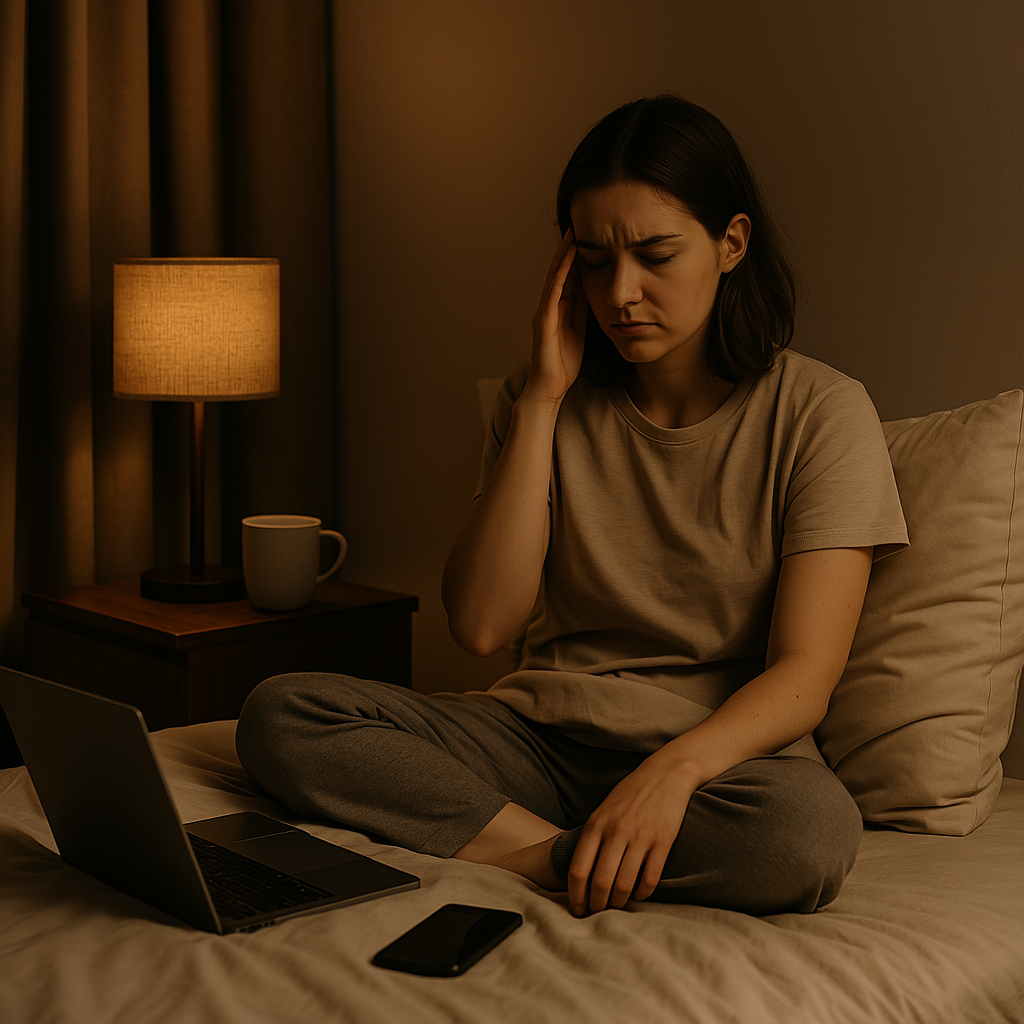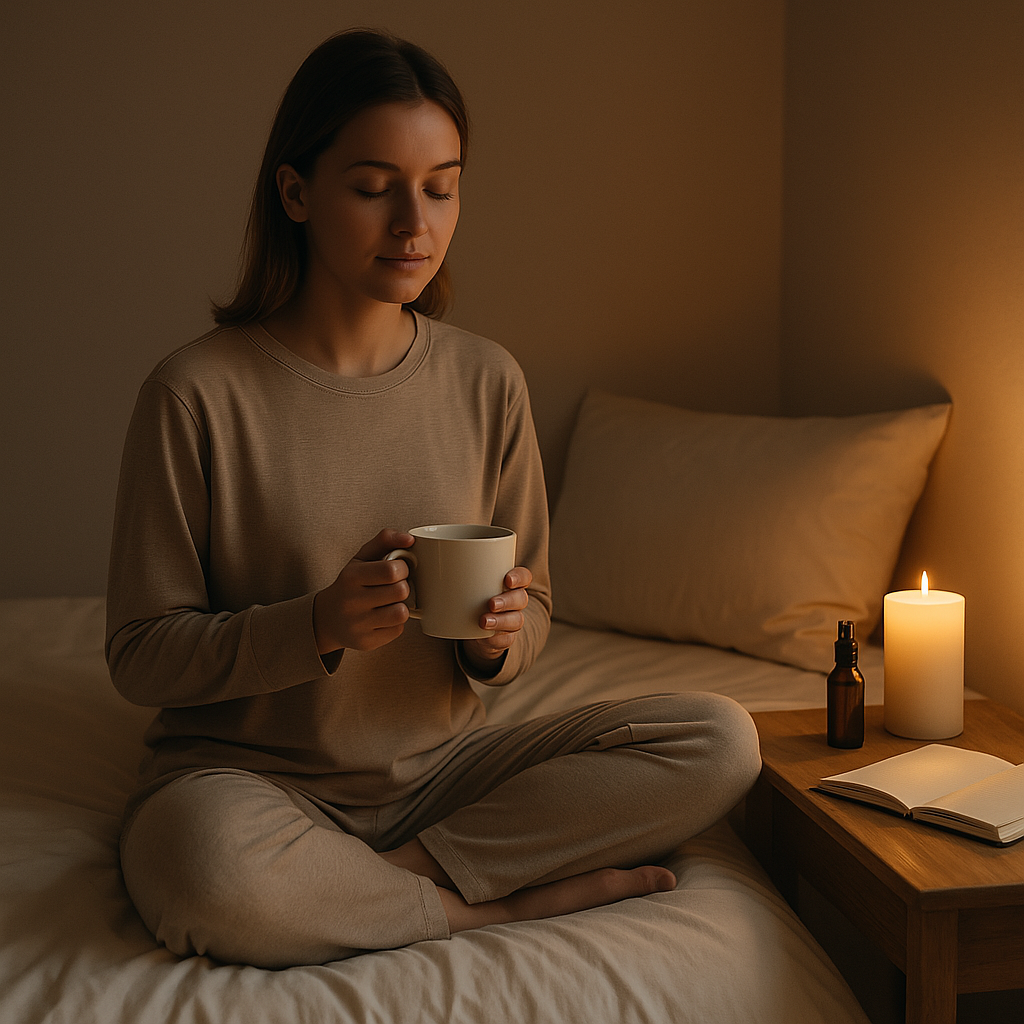Struggling to fall asleep — or stay asleep? You’re not alone.
At Slumberite, we believe good sleep is a right, not a luxury. But when your nights are restless and your days are foggy, even that can feel out of reach. The truth is, sleep issues don’t always start in the bedroom. Sometimes it’s the habits, the environment, or even what’s not on your radar that’s silently sabotaging your rest.
In this guide, we’ll walk you through the 7 most common causes of poor sleep — and how to fix them with simple, science-backed tweaks you can start using tonight.
Let’s get into it.
1. Too Much Screen Time Before Bed
The problem: Blue light from your phone, laptop, or TV interferes with melatonin — the hormone your body uses to wind down. Even quick scrolling before bed can keep your brain in a state of alertness when it should be winding down.
The fix:
- Try switching off screens at least 60 minutes before bed.
- Use your phone’s Night Shift or Eye Comfort mode after dark.
- Swap evening scrolling for a soothing routine: journaling, stretching, or simply sitting in silence with a warm herbal tea.
2. An Inconsistent Sleep Schedule
The problem: Your body’s internal clock — also known as your circadian rhythm — craves consistency. Sleeping in on weekends or staying up too late confuses that rhythm, making it harder to fall asleep and wake up feeling refreshed.
The fix:
- Set a consistent bedtime and wake-up time (yes, even on weekends).
- Aim for 7–9 hours of sleep per night.
- Go to bed when you’re sleepy, not just when the clock says so — but consistency is key.
3. Too Much Light or Noise in Your Bedroom
The problem: Even low levels of light or subtle background noise can reduce melatonin production and prevent deep, uninterrupted sleep.
The fix:
- Blackout curtains, soft earplugs, or a white noise machine can help.
- Try a contoured 3D Sleep Mask — it blocks out light without pressing on your eyes.
- If you live in a noisy environment, noise-cancelling earplugs can make a world of difference.
✨ At Slumberite, we designed our Fall Asleep Faster Kit to solve exactly this. It includes both the 3D Sleep Eye Mask and our soft, reusable noise-cancelling earplugs — for total sensory calm.
4. Stress and Racing Thoughts
The problem: It’s hard to sleep when your mind won’t stop spinning. Stress increases cortisol (your alertness hormone), keeping your brain on high alert — even if your body is exhausted.
The fix:
- Try a “brain dump” journaling session before bed to clear mental clutter.
- Use slow, deep breathing (inhale for 4, hold for 7, exhale for 8).
- Create a bedtime ritual that signals “it’s safe to relax now.”
5. Caffeine and Alcohol Too Close to Bedtime
The problem:
- Caffeine (coffee, energy drinks, even chocolate) can stay in your system for 6–8 hours, silently disrupting your ability to fall asleep.
-
Alcohol may make you feel sleepy, but it fragments your sleep later in the night — often causing 2–3AM wake-ups.
The fix:
- Avoid caffeine after 2PM.
- Limit alcohol to earlier in the evening, and drink water to balance.
Your best bet? Herbal teas like chamomile, lemon balm, or passionflower in the hours before bed.
6. A Sleep Environment That’s Too Hot, Cold or Uncomfortable
The problem: Temperature plays a major role in how well you sleep. Your body naturally cools down before bed — but if your room is too warm or your bedding traps heat, it disrupts that natural flow.
The fix:
- Keep your bedroom cool, ideally between 16–19°C.
- Choose breathable fabrics for bedding and sleepwear.
- Keep clutter to a minimum to create a restful, sleep-first space.
7. Underlying Health or Hormonal Imbalance
The problem: Sleep struggles can also be linked to sleep disorders (like sleep apnea), anxiety, or hormonal shifts — especially during menopause or periods of high stress.
The fix:
- Track your sleep patterns (you can use our 7-Day Sleep Tracker, included free with select orders).
- If problems persist after lifestyle changes, consult a doctor or sleep specialist.
- Be gentle with yourself — fixing sleep takes time, but small shifts add up.
Your Sleep-Fix List
- Let’s recap the top 7 culprits — and how to take back your rest:
- Screens before bed → Reduce blue light and build a calming wind-down ritual.
- Irregular sleep schedule → Go to bed and wake up at the same time daily.
- Too much light/noise → Create a dark, quiet space with the right tools.
- Stress and mental overload → Journaling, deep breathing, and intentional rest.
- Caffeine/alcohol timing → Be mindful of what you drink and when.
- Uncomfortable sleep space → Keep things cool, breathable and clutter-free.
- Underlying health issues → Don’t ignore your body — seek help if needed.
💡 Ready to Transform Your Sleep?
Start with just one or two of these shifts this week — progress over perfection. Sleep isn’t a switch, it’s a habit. And you’re already on the right track.
Looking for an all-in-one solution to calm your senses, block out distractions, and fall asleep faster? 👉 Shop the Fall Asleep Faster Kit
💬 Frequently Asked Questions (FAQs)
Why am I so tired but can’t fall asleep?
This usually points to mental overstimulation or disrupted circadian rhythms. Even if your body is tired, things like screen time, late caffeine, or anxiety can keep your brain “on”.
How long before bed should I stop using my phone?
Ideally, 60 minutes before sleep. This gives your brain time to reduce melatonin-blocking blue light exposure and shift into rest mode.
What temperature should my bedroom be for optimal sleep?
Between 16–19°C (60–67°F) is the ideal range for most people. Cooler environments help your core body temperature drop naturally, which promotes better deep sleep.
Is it bad to have a glass of wine before bed?
Alcohol may make you feel drowsy, but it disrupts your REM sleep and causes more wake-ups in the second half of the night. If you do drink, keep it light and earlier in the evening.
Can earplugs and sleep masks really improve sleep?
Yes — reducing light and noise can dramatically improve sleep quality. Your brain still registers sensory input during sleep, so blocking these signals helps you stay in deeper, more restorative sleep stages.
How do I reset my sleep schedule quickly?
Start by waking up at the same time every day, even on weekends. Get bright natural light in the morning, avoid naps, and go to bed only when sleepy (not just when the clock says so).
How do I know if I have a sleep disorder?
If you’ve tried all the lifestyle adjustments and still struggle with falling or staying asleep, wake up gasping, or feel exhausted even after a full night’s sleep, it might be worth speaking to a sleep specialist. Conditions like sleep apnea or insomnia may be at play.


Leave a comment
This site is protected by hCaptcha and the hCaptcha Privacy Policy and Terms of Service apply.